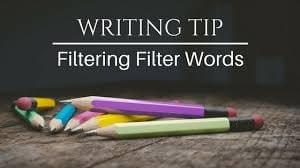
For 2019, I'm focusing on a new direction -- editing the existing MS.
I wrote in a post last year that I wasn’t too concerned with word count. I wanted to write and get the story down first, ironing out plot changes, developing characters, crafting dialogue, and building the world on the page.
Now I start editing for word count. That doesn't mean I haven't edited for word count several times before this. I do this every time I rewrite the story, so when I come back for additional plot / character / world building edits, I'm working with as lean a copy as I can.
This is editing, and it’s where the magic happens – when I start eliminating words.
And wow, have I got words to eliminate! It’s no small order. I know there are some very simple things I can do, at this point, to lower the word count quickly.
The first is to search for specific filtering verbs and prepositions, and write them out. I use the "Find" function in Word.
There’s a pretty good list of filtering verbs here: An Introduction to Filtering
A key tip-off that you’ve got these is not just the unnecessary subject and verb, but also the preposition that follows immediately after: “He watched as the dragon escaped. “ Do you see the, "He watched" and the preposition, "as"?
Generally, you can eliminate the “He watched as,” capitalize the first word of the next clause (which is inevitably an article, a, an or the) and be done with it. You get, "The dragon escaped."
WARNING: Don't be fooled into thinking you don't have these if you don't see the preposition. Often writers leave off the preposition, thinking it's a more active verb construction, but make no mistake, it’s there, even if it’s not written on the page. Say the sentence to yourself, out loud, and see if a preposition fits: "He watched the dragon escape." Could you insert the preposition? Yes. It may be a slightly better construction, omitting the as, but it's still holding onto unnecessary baggage. If you turn the once subordinate clause into an independent one, in either construction, you get a slim, trim, active, heart-thumping: "The dragon escaped."
It's still your character's observation. And I promise, you haven't changed the POV. But you have just sent a signal, loud and clear, to your reader, and it's one he or she's been dying to see from you since the opening pages. You're telling your reader, in clear terms, that you trust him or her to be able to follow the story, to know the POV character saw the action. You've said, "You're a smart reader. I don't need to spell this out for you." It makes your reader active in the story. You and your reader are now in a trusting relationship till the end of the book, just by editing out 3 excess words. Congrats.
That's why they're called "filtering" words -- they put a filter, a screen, a net between your story and your reader. When they're used, they scream that you, the author, don't trust your reader to know what's going on in the story.
Once you do this little bit of editing, you'll hook your reader. Now edit your way to keeping him or her!
If you're anything like me, even though I know, instinctively, I'm not supposed to write these, I do it anyway. Perhaps I'll learn, over time, not to write them the first time (or the 8th!). For now, they creep in, and I've got to go on a seek-and-destroy mission, except when I want to signal to my reader to pay attention to a particular observation or feeling my main character experiences. By consistently not using these verbs / words, it's a signal to my reader to pay special attention when I do use them -- once or twice at key points.
I ended up eliminating 1,000 words this way, tightening the action.
Some common filtering verbs to watch for:
to see
to hear
to think
to touch
to wonder
to seem
to decide
to know
to feel
to notice
to realize
to watch
to sound
